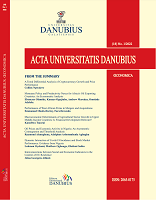An Empirical Analysis of the Working Capital Management Practices of South African Retail Firms
An Empirical Analysis of the Working Capital Management Practices of South African Retail Firms
Author(s): Garikai Mandipa, Athenia Bongani SibindiSubject(s): Business Economy / Management, Regional Geography
Published by: Editura Universitară Danubius
Keywords: Cash conversion cycle; conservative working capital policies; retail firms; South Africa; working capital management strategies;
Summary/Abstract: Working capital is considered to be the ‘lifeblood’ of businesses. Working capital strategy can best be described as a strategy made by the firm for making decisions on two important things, namely how much to invest in each component of current assets, and how to finance those investments. Against this backdrop the present inquiry sought to examine the working capital management strategies employed by the South African retail firms. The study employed a panel of retail firms listed on the Johannesburg Stock Exchange (JSE) for the period 2010-2019 as the unit of analysis. Working capital management was proxied by cash conversion cycle (CCC), average age of inventory (AAI), average collection period (ACP), and average payment period (APP). Descriptive and correlational analyses were employed for empirical investigation. The data were derived from the Orbis dataset and taken from the financial statements of 16 retail companies listed on the JSE. The findings of the study revealed that South African retail firms predominantly employed conservative working capital policies. More specifically, the results of the study documented that ACP and AAI were higher than APP for the sample of South African retail firms. Thus, the firms were holding more current assets in the form of trade receivables and inventories, relative to current liabilities, which in turn increased the length of the CCC.
Journal: Acta Universitatis Danubius. Œconomica
- Issue Year: 18/2022
- Issue No: 3
- Page Range: 161-175
- Page Count: 15
- Language: English

